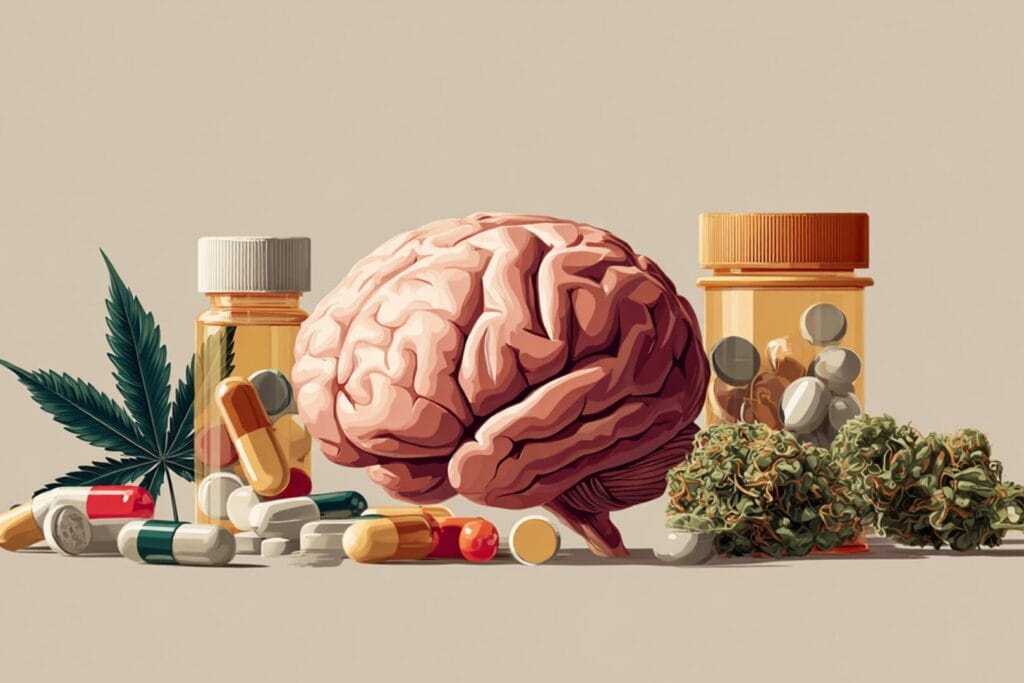Overview
A relapse is when someone who has overcome an addiction falls back into usage. More generally, it’s when a condition that had been improving starts to deteriorate. When a person who used to abuse alcohol or other substances resumes their addictive behavior after abstaining from it for a while, this is referred to as relapsing.
Relapses can be frequent or even anticipated, and those trying to overcome addiction are likely to experience one or even several relapses before finally quitting. According to the stages-of-change model, people will cycle through a pattern of avoiding, thinking about quitting, actually stopping, and then relapsing. Before giving up, some people go through the stages multiple times.1
Why Does Relapse Happen?
For a long time, people have believed that addiction is a choice rather than an illness. However, drug or alcohol addiction is influenced by environmental, biological, and behavioral variables. The brain is altered by substance misuse over time as well. Some addiction specialists have compared it to the brain being “taken over” by alcohol or narcotics. 2
Abuse of drugs affects the brain’s reward system. When individuals act in a manner that supports their survival and is healthy, the brain rewards them. A brain that has experienced substance addiction thus rewards individuals by asking for more alcohol and drugs. The “rewiring” of some of the functional and structural components of the brain causes it to assume that it is dependent on substances to survive. This causes those with previous substance abuse issues to frequently relapse.
Why are Relapse Prevention Skills Important?
Learning how to live a happy life in recovery requires knowledge of relapse prevention coping skills. One can learn to use these coping mechanisms one day at a time to avoid relapsing and lead a fulfilling life beyond their expectations.
Getting sober from alcohol or other drugs involves personal development and developmental stages. Relapse risk exists at every level of recovery; therefore, learning and understanding relapse prevention techniques is crucial.
What Are the Signs of Relapse in Addiction?
Symptoms of relapse in addiction can be grouped into three separate types. These will be detailed below.
Signs of Emotional Relapse
Although people are not actively considering using drugs at this point, their actions and feelings may increase their risk of doing so in the future. They are determined not to experience another relapse after their previous one. Denial plays a significant role in emotional relapse because individuals aren’t consciously considering using it at this point. The following are signs of emotional relapse:
- Not attending group meetings
- Isolating
- Bottling up emotions
Signs of Mental Relapse
In this stage, people are contemplating taking the substance, and some may even start to miss the people and environments they once associated with substance use. The person’s cognitive resistance to relapse decreases as they sink further into mental relapse and become more desperate for escape. Common signs of mental relapse include:
- Craving for drugs or alcohol
- Thinking of schemes to better control using
- Thinking about people, places, and things associated with past use
- Looking for relapse opportunities
Signs of Physical Relapse
The actual act of resuming drug abuse is known as a physical relapse. A lapse is the initial use of alcohol or drugs, while a relapse is the return to uncontrolled abuse of substances. A lapse and relapse are two terms used by some researchers to describe physical relapse. The majority of physical relapses are opportunity relapses. They happen when the person believes others might not catch them.
Factors That May Affect Any Relapse Prevention Strategy
The following are factors that may affect any relapse prevention strategy:
Environment
For many addictive behaviors, long-term abstinence rates are substantially correlated with positive social support and environment. The level of support provided by individuals around an addict is the best predictor of abstinence.
Negative social support, such as interpersonal conflict and peer pressure to use drugs, has been linked to an increased chance of relapse. Substance abuse is more likely to occur in families where negative behaviors are present.
Level of Motivation
Both the drive to engage in the problematic behavior and the motivation to change one’s behavior positively might have an impact on the relapse process. This exemplifies the problem of ambivalence faced by several individuals trying to change addictive behavior. Motivational interviewing can facilitate the process of encouraging change. 4
The Severity of a Person’s Addiction
Relapse prevention coping skills may be impacted by the extent of an individual’s addiction. Individuals risk relapsing if appropriate treatment techniques are not used in accordance with the severity of their addiction.
Co-Occurring Mental Health Conditions
A person who is addicted may relapse due to underlying or common mental health issues like PTSD, bipolar illness, and other mental disorders. The relapse prevention technique may be affected if effective treatment for mental health disorders is not included in treatment plans.
Other Factors
Several less evident factors also influence the relapse process. Lifestyle factors, including general stress levels, and anxiety levels, are among these other causes.
Top 10 Relapse Prevention Skills
Skills that aid in reducing the chances of relapsing include: 3
1. Know Your Potential Risks
Anxiety, tension, and low self-esteem are internal risks of potential relapse, while people, places, or things that bring up unpleasant memories are examples of external triggers. An effective technique to become aware of one’s risks and lower the chance of relapsing is to list these internal and external causes.
2. Self-Care
During recovery from addiction, sleeplessness and exhaustion are frequent post-acute withdrawal symptoms that might serve as relapse risks. One can enhance sleep quality by engaging in physical activity and maintaining a healthy diet. This will assist in retraining the body to sleep more soundly while also lowering the risk of relapse
3. HALT
HALT stands for Hungry, Angry, Lonely, and Tired. Individuals should ask themselves whether they are experiencing any of these symptoms, have a craving to use, or are feeling anxious. For many alcoholics and addicts in recovery, hunger, anger, loneliness, and exhaustion are the most frequent risks to lead them to start using again. One can reduce the chance of relapse by performing a routine HALT inventory.
4. Mindfulness Meditation
The concept of mindfulness meditation educates people to become more self-aware. Individuals are better able to handle potential relapse risks when they are more self-aware.
The people who practice mindfulness meditation report fewer cravings, greater awareness, and longer periods of sobriety. Participants in mindfulness meditation are urged to learn to embrace their cravings rather than resist them. This practice, combined with relapse prevention techniques, teaches the ability to accept that urges will occur.
5. Join a Support Group
Regularly attending a support group like Alcoholics Anonymous (AA) or Narcotics Anonymous (NA) gives you support, accountability, and knowledge. It also provides the chance to connect with others who share your struggles. Peer support and a sponsor can be crucial components of rehabilitation. It further prevents relapse by reducing feelings of isolation and the chance of feeling lonely, both of which are frequent relapse risks.
6. Grounding Techniques
The most significant challenges to healing are frequently stress and worry. The 5-4-3-2-1 coping strategy is a grounding approach that can be used to prevent relapse. It guides people through the five senses to help them focus on the present moment and avoid thoughts of consuming alcohol or other substances.
Gaining self-awareness and mindfulness through sensory focus will assist people in completing everyday relapse prevention activities and overcoming negative thoughts and sensations. The grounding technique helps individuals feel more in control and less overwhelmed and lowers their risk of relapse.
7. Deep Breathing
Breathing has a profound effect on your emotions and contributes to mood regulation. Deep breathing is crucial for maintaining good mental health. Deep breathing causes the brain to release neurotransmitters, many of which cause feel-good chemicals to be released, resulting in relaxation, happiness, and pain relief.
8. Make an Emergency Contact List
It can be challenging to control urges when they arise, especially in the early stages of recovery. Making a list of family or friends who are also in recovery or are just good sources of support can be a great way to know who to call for assistance when you may need it.
Individuals can overcome the craving and keep in mind why they do not want to relapse by talking to a trusted confidante.
9. Play the Tape Through
“Playing the tape through” is a recovery technique that is a great tool if you have an urge to drink or use drugs and consider your options. This is where you must mentally simulate what will happen if you do end up relapsing to “complete” the tape. Consider the immediate and long-term effects of choosing to use drugs or consume alcohol, along with the effects of using as opposed to the effects of not using. This can aid in decision-making and lower the chances of relapse.
10. Ask for Help
The worry of relapsing can be overpowering. When individuals are completely prepared and have effective coping mechanism skills, it need not be that way. The chance of relapse can be significantly decreased by incorporating these prevention skills into your everyday routine.
To learn more about inpatient or outpatient treatment programs or receive help immediately, consult with a committed treatment professional at San Diego Detox.
Treatment Programs for Relapse Prevention
Participants in relapse prevention programs will interact with others equally dedicated to avoiding relapse and attaining long-term recovery. Experts in the field of addiction treatment will use a therapeutic, evidence-based approach that is tailored to individual needs.
Is Treatment Necessary for Every Relapse?
Yes. Returning to therapy after a relapse will help individuals figure out what aspects of their recovery strategy are working, and which aren’t. Depending on how severe and extensive the relapse is, inpatient treatment may be the best option for reinstating the recovery strategy.
Is There Hope Even After a Complete Relapse?
After a relapse, there is hope. Relapse does not indicate that the rehabilitation process was unsuccessful. Individuals should view relapse in recovery as an opportunity to learn something new that will be helpful in the future and as a step toward achieving sustainable healing.
Learn Relapse Prevention Skills Now at San Diego Detox
Contact San Diego Detox for counseling if you or a loved one are struggling with addiction problems. San Diego Detox uses behavioral treatments to change alcohol and substance abuse. Learn relapse prevention skills to successfully cope and recover from addiction at San Diego Detox prevention treatment programs.
Resources
https://www.niaaa.nih.gov/alcohols-effects-health/overview-alcohol-consumption/what-standard-drink
https://www.drugfreeworld.org/drugfacts/alcohol/short-term-long-term-effects.html
https://www.ncbi.nlm.nih.gov/pmc/articles/PMC2913110/
https://www.webmd.com/mental-health/addiction/understanding-alcohol-abuse-symptoms






